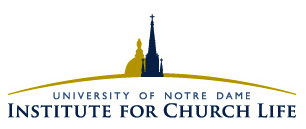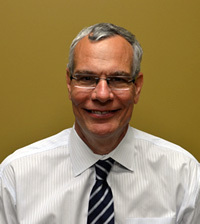
Philip Sloan, professor emeritus in Notre Dame’s Program of Liberal Studies, is speaking to a lecture hall full of undergraduate students about what it means to be a human being and what that means for the sciences.
A philosopher and historian of science, Sloan emphasizes that the concept of human dignity, the insistence that a human being is literally invaluable, is not only central to the social teaching of Roman Catholicism, but emerges from a philosophical tradition with ancient and pre-Christian Greek and Roman roots. It is a concern not only of the church, but of the United Nations, whose Millennium Declaration acknowledges “a collective responsibility to uphold the principles of human dignity, equality and equity at the global level.”
A progression of slides flashes across a large projector screen behind him as he speaks of what Pope John Paul II called “an ontological difference, an ontological leap” distinguishing a human being from the rest of nature. An image from the Chauvet Pont d’Arc cave in the south of France appears on the screen, a stencil of a human hand, purposefully left on the cave wall some 36,000 years ago. It is a riveting visual aid.
Sloan is one of a series of philosophers, political scientists and theologians invited to speak to the undergraduate students enrolled in the course “On Human Dignity.” Other contributors to the unique course, offered by the Institute for Church Life Human Dignity Project, are Notre Dame philosopher David Solomon, William P. and Hazel B. White Director of the Center for Ethics and Culture; O. Carter Snead, professor of law; Margaret Pfeil, assistant professor of theology; and Daniel Philpott, associate professor of political science and peace studies.

The principal lecturer and designer of “On Human Dignity” is John Cavadini, McGrath-Cavadini Director of the Institute for Church Life, who describes the course as an examination of “the theological presuppositions of the concept of human dignity.”
According to Cavadini, “that concept—of the unique and incomparable value of the human person—is an essential foundation of Catholic teaching on human rights, including the right to life as well as all other human rights treated in Catholic social teaching.”
Notwithstanding its indispensability, Cavadini says, “the very idea of human dignity has, in the last two decades, come under assault, so much so that it has been declared a meaningless concept by some secular theorists, and even ardent supporters of the idea have conceded that there is no common understanding of what ‘human dignity’ means. This presents a challenge to believers in human dignity to make their case in terms accessible both to persons of faith and persons of no faith.”
“On Human Dignity” is intended as an answer to that challenge, and Cavadini is confident that it is already demonstrating some success. “We clearly have tapped into an area of interest among undergraduate students,” he says. “There are about 70 students enrolled, and the course has a high energy level, with lectures followed by vigorous discussion that, at least for me, is resulting in what the Catholic Worker movement’s co-founder, Peter Maurin, used to call ‘clarification of thought.’ I am certainly receiving as much as I am giving!”
Contact: Michael Garvey, Office of Public Relations, mgarvey@nd.edu